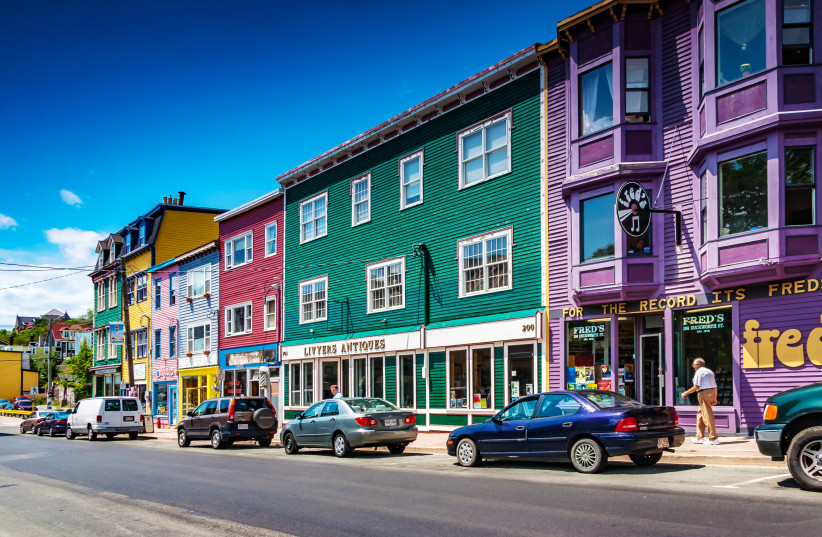Newfoundland and Labrador, the easternmost province of Canada, consists of the Island of Newfoundland, with a population of a little more than one-half million, and Labrador, a sparsely inhabited territory on the mainland. The province is one of Canada’s best-kept secrets. I have visited twice.
The capital, St. John’s, is a small but surprisingly cosmopolitan city with a spectacular harbor. The rest of Newfoundland’s scenery is equally spectacular and the people are warm and friendly, as the passengers on several airliners discovered when their planes had to land at the airport in Gander during the events of 9-11. However, Newfoundland (the name before 2001) has a dark history where Jews are concerned.
Newfoundland, one of Britain’s oldest overseas colonies, did not become a part of Canada until 1949. It received self-governing status as far back as 1854, and became an independent Dominion of the British Empire in 1907, the same status as Canada, Australia, and New Zealand.
In 1933, economic collapse led to the reestablishment of direct British rule by way of a six-member Commission of Government, three appointed from Britain and three from Newfoundland, presided over by a British-appointed Governor.

By the middle 1930s, there were only a little more than 200 Jews in Newfoundland, out of a total population of 280,000. (There are about the same number of Jews today.) However, Newfoundland attracted the attention of thousands of desperate Jews seeking a haven from the antisemitism and persecution that ultimately resulted in the Holocaust.
Why did so many Jews seek sanctuary in Newfoundland? Gerhard Bassler, a history professor at Memorial University, has written about this episode in Sanctuary Denied: Refugees from the Third Reich and Newfoundland Immigration Policy (1992). In fact, Bassler found that about 12,000 Jews sought entry to Newfoundland during the lead up and early period of World War II. Many of them were highly qualified professionals such as doctors, as well as families of means and, in some cases, applicants who were immediate relatives of members of the existing Jewish community.
Jewish refugees were settled in Newfoundland
In addition to pleas for admission from individuals and families, Bassler documents proposals from organizations, such as Baron de Hirsch, to settle groups of Jews in Newfoundland. The proposals were designed to help reduce the 25% unemployment rate, spur agricultural and industrial development, or provide qualified medical personnel to communities that needed them.
A proposal organized by a member of the St. John’s Jewish community offered to settle groups of Jewish refugees in Labrador in order to promote its industrial development. Another, from a Seattle-based American entrepreneur, involved the settlement of Jewish refugees in Labrador to stimulate timber exports and develop a fish cannery. All three projects claimed to be self-funded ventures that would not be a financial burden to Newfoundland.
ALL APPEALS – whether by individuals or by organizations – were unsuccessful. Only 12 Jewish refugees entered Newfoundland between 1933 and 1945, and these included a rabbi and his family and medical personnel hired because they were the only qualified individuals available, not because they were refugees. Bassler writes, “Not a single one of thousands appealing for rescue from persecution, including sponsored parents and brothers of naturalized Newfoundlanders, was saved.” According to Bassler, the xenophobic attitude of the Governing Commission toward non-British immigrants was to blame.
So why did so many Jews seek safety in Newfoundland? Bassler could only point to a generous clause in the Newfoundland Aliens Act of 1906, which offered asylum to refugees fleeing religious or political persecution. Does this mean that desperate Jews combed the constitutions and legislative literature of various jurisdictions to see which appeared to be more welcoming? Possibly. However, I think a more likely explanation has something to do with the Evian Conference of 1938.
In 1938, representatives of 32 countries met in the French spa town of Evian-les-Bains to find a solution to the Jewish refugee crisis precipitated by the antisemitism unleashed in Germany in 1933 and in Austria in 1938. Hundreds of thousands of Jews were stateless. There were fears for the safety of millions more in Eastern Europe.
The conference, an initiative by former president Franklin Roosevelt, was an abject failure. With the exception of the Dominican Republic (in the end only 700 Jewish refugees found sanctuary there), no country, including Canada, Australia, and New Zealand, agreed to accept Jewish refugees. (Newfoundland did not participate, presumably because of the loss of its independent status.)
On July 22, 1938, one week after the close of the conference, an editorial titled ‘Happier than Palestine’ appeared in the Ottawa Evening Citizen newspaper. The key points were that Jews would be happier in Newfoundland than in Palestine, particularly those from Poland who were used to severe winters, and that the people of Newfoundland needed help to develop their natural resources. It concluded with “… An organized migration to new found land, to include educated and cultured Jewish families, up to the same high standard as the Jewish home builders in Palestine, could make the oldest British colony indeed a new found land of contentment and security.”
On July 26, 1938, the Jewish Telegraphic Agency (JTA), a worldwide Jewish wire news service founded in 1917, and still an important source of news, reprinted the editorial that appeared in the Ottawa Citizen. The JTA report must have caught the attention of Jews needing a place to go. Sadly, as Gerhard Bassler discovered (Bassler died in 2023), sanctuary was denied.
The terrible events that led to the Holocaust were incremental in nature. Each new step took place in response to the callous indifference of much of the world to the plight of the Jews. In this context, the refusal by the powers governing Newfoundland to grant succor to any Jew seeking help, had widespread and terrible repercussions.
The writer, a fellow of the Royal Society of Canada, is a retired professor, who taught at the University of Waterloo.
